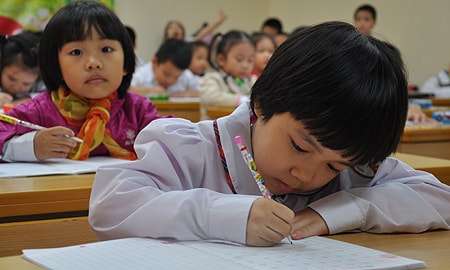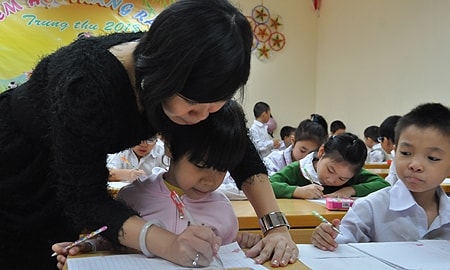Big changes in the way primary school students are assessed
The Ministry of Education and Training has directed that in this new school year, schools will not use scores for regular assessment, but instead will use positive comments to motivate and encourage students. There will be two periodic tests per year.
 |
The Ministry of Education and Training has just issued regulations on primary school student assessment, effective from October 15, 2014; replacing Circular No. 32/2009/TT-BGDDT on promulgating regulations on primary school student assessment and classification.
Parents and students participate in the evaluation
Accordingly, the assessment principle must be for the progress of students; attach importance to motivating and encouraging students' positivity and overcoming difficulties in studying and training; help students develop all their abilities; ensure timeliness, fairness and objectivity;
Comprehensive assessment of students through assessment of the level of knowledge, skills and some manifestations of students' abilities and qualities according to primary education goals;
Combine teacher, student and parent assessments, in which teacher assessment is the most important;
Evaluate student progress, do not compare one student with another, do not put pressure on students, teachers and parents.
Assessment includes regular assessment and periodic assessment.
In regular assessments, teachers record the most notable comments in the education quality monitoring book, the results students have achieved or have not achieved; specific measures to help students overcome difficulties to complete tasks;
Specific manifestations of the formation and development of students' abilities and qualities; things that need special attention to help in the process of monitoring and educating individuals and groups of students in their studies and training.
In particular, do not use scores for regular evaluation.
 |
1 year 2 graded tests
In addition to regular assessment by comments, the principal directs the periodic assessment of learning outcomes, knowledge and skills standards according to the primary education program at the end of the first semester and the end of the school year for the following subjects: Vietnamese, Math, Science, History and Geography, Foreign Languages, Information Technology, and Ethnic Languages through periodic tests.
The periodic test questions are suitable for knowledge and skill standards, including questions and exercises designed according to 3 levels of student cognition, from helping to test recognition or memory to the level of connecting and rearranging learned knowledge and skills to solve new situations and problems, similar to learned situations and problems, and applying knowledge and skills to solve new situations and problems, unlike the situations and problems that have been instructed or giving reasonable responses to a new situation or problem in study or in life.
The periodic test is corrected by the teacher, the advantages are commented on and the limitations are suggested, and the score is given on a scale of 10 (ten), no 0 (zero) and decimal points are given.
At the end of the first semester and the end of the school year, the principal directs the homeroom teacher to meet with teachers in the same class, through comments on the learning process and results, other educational activities to synthesize and evaluate the level of formation and development of capacity and qualities of each student in terms of:
During the learning process of each subject, students are classified into one of two levels: Completed or Incomplete;
The level of capacity formation and development is classified into 2 levels: Achieved or Not achieved;
The level of formation and development of qualities also classifies each student into one of two levels: Achieved or Not Achieved;
The homeroom teacher records comments and the results of the assessment in the report card. The report card is a document certifying the level of completion of the program and identifying tasks, things that need to be overcome, and help for each student when starting the second semester or the new school year.
According to vietnamnet.






